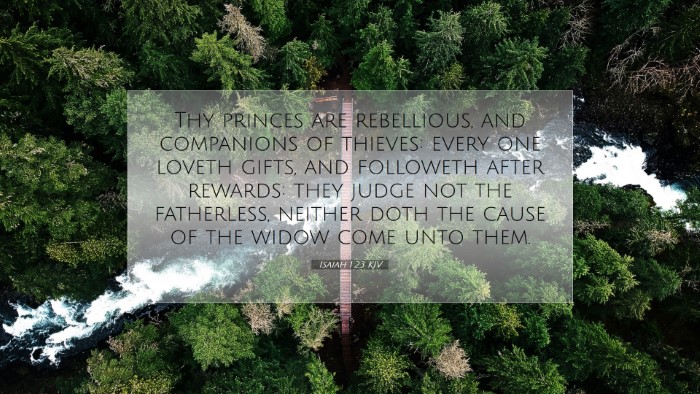Commentary on Isaiah 1:23
Verse: "Your princes are rebellious, and companions of thieves: every one loveth gifts, and followeth after rewards: they judge not the fatherless, neither doth the cause of the widow come unto them." (Isaiah 1:23, KJV)
Introduction
Isaiah 1:23 provides a profound glimpse into the moral and social decay of Judah during the time of the prophet Isaiah. This verse highlights the corruption of leadership and the failure of justice. The implications of these corrupt actions are significant as they reveal the broader spiritual and societal ramifications that stem from neglect of divine principles.
Exegetical Insights
This verse employs stark imagery regarding the character of Judah's leaders, portraying them as rebellious and aligned with thieves. The prophet contrasts their actions with the divine expectations established for governance, underscoring their moral bankruptcy.
Rebellion and Corruption
Matthew Henry suggests that the leaders’ rebellion is not merely against human authority but is primarily a rebellion against God Himself. Their alliances with thieves symbolize a departure from integrity and righteousness, aligning themselves instead with those who exploit the vulnerable. This highlights a systemic failure in leadership that reflects a broader societal issue.
Greed and Exploitation
Albert Barnes elaborates on the greed that pervades the leadership, noting that their love of gifts and pursuit of rewards corrupts their judgment. The leaders prioritize personal gain over justice, resulting in neglect of those in need—particularly the fatherless and the widow. These two groups often symbolize the most vulnerable in society, and their mistreatment reveals a catastrophic moral failure.
Failure of Justice
Adam Clarke notes that the leaders’ inability to judge fairly leads to a society fractured by injustice. Their systemic corruption deprives the helpless of their rights and exacerbates the plight of the marginalized. Clarke stresses that the absence of justice in governance forms a direct challenge to the covenantal principles established by God, which call for protection and advocacy for the weak.
Theological Reflections
This verse serves as a powerful reminder of the responsibilities inherent in leadership within a faith context. It raises crucial theological questions about the nature of divine justice and the expectations God holds for those in power.
Divine Justice vs. Human Corruption
This passage confronts the tension between divine justice and human corruption. While leaders are expected to act justly and reflect God’s character, their actions often contradict the holiness of God. Henry remarks that the nature of God’s judgment is closely tied to societal structures, whereby leaders are accountable for their actions, especially concerning those they are called to protect.
Lessons for Modern Leadership
The warning from Isaiah remains relevant for contemporary leaders in the Church and society. There is a divine mandate to advocate for the oppressed and to ensure equitable treatment of all individuals, particularly the marginalized. Barnes emphasizes that the failure to heed this call invites severe judgment and divine retribution.
Practical Applications
For pastors, students, and theologians, Isaiah 1:23 serves not only as a historical account but also as a call to action. The insights derived from this passage compel leaders to engage in reflective practices, ensuring that their governance aligns with biblical principles.
- Self-Examination: Leaders are called to evaluate their motives and actions, asking if they genuinely serve others or if they are pursuing personal gain.
- Advocacy: Churches and their leaders must actively support the causes of the marginalized and engage in justice-oriented initiatives.
- Integrity in Leadership: The pursuit of integrity in leadership is essential for fostering a community rooted in Godly principles and moral excellence.
Conclusion
Isaiah 1:23 captures a critical moment of indictment against the leaders of Judah, serving as a timeless reminder of the significance of moral leadership. The collective failure to judge the fatherless and care for widows encapsulates a broader injustice that God fiercely opposes. Through faithful exegesis of this verse, one is led to a deeper understanding of God’s expectations for justice and righteousness in leadership contexts.


